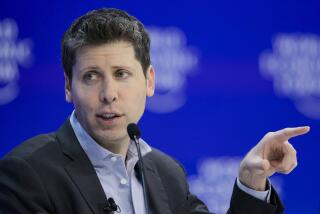It’s hard to pile on an O.C. philanthropist
- Share via
I loved the federal lawsuit last week that led Henry Samueli to step down as chairman of one of the most storied companies in Orange County history.
It’s not what you may think: I didn’t get some sick delight in seeing a rich man get knocked down a peg. I’ll leave that particular behavioral trait to certain segments of my readership (you know who you are).
No, I loved it because it raises provocative questions about judging people. Let’s face it, we all love to judge others, and what better subject to put in the docket at the moment than Mr. Samueli, who cofounded computer-chip maker Broadcom in 1991 and who, along with cofounder Henry Nicholas, became a billionaire after the company went public?
Here’s my question: How much should we allow the Securities and Exchange Commission’s action to affect our opinion of Samueli, whose foundation has given away a reported $200 million in recent years to various charities and institutions?
What I wouldn’t give right about now for a profound insight.
I don’t have one, but I want to repeat the figure that he and his wife, Susan, have given away: $200 million. Take an extra moment to grasp the magnitude of what that much cash can do.
I don’t have an itemized list to tell me where the money has gone, but I know it is as diverse as donations to medical research and a check for the Ocean Institute in Dana Point. Previous stories about Samueli put him in the forefront of Orange County’s new generation of philanthropists, citing gifts to Jewish centers, UCLA and UC Irvine, and the local fine arts scene. The Times reported in 2006, for example, that Samueli gave $10 million to the new concert hall at the Orange County Performing Arts Center. Nicholas reportedly gave $3.8 million, among other gifts.
Lots of rich people give away money, whether out of the goodness of their hearts or out of the goodness of the IRS tax write-off, but Samueli has distinguished himself.
“It’s without precedent in Orange County for anybody to be able to give so much to so many organizations,” the concert hall’s former fundraiser told The Times in 2006. “He’s got a much wider breadth and depth of interest than you might expect that high-tech image to possess.”
Now comes the SEC charges, which allege that the Broadcom founders illegally manipulated stock options for five years. The alleged actions benefited some Broadcom employees but defrauded shareholders, the SEC says. Neither Nicholas nor Samueli benefited from the actions, the SEC noted.
Nicholas left the company in 2003; in stepping down last week, Samueli said it would be “inappropriate” for him to continue as chairman while the SEC case was pending. Both men have denied through their attorneys that they acted improperly. The SEC suit also named one current and one former Broadcom executive, and they also denied acting improperly.
Samueli is by far the highest profile in the group. Aside from his charitable deeds, he owns the Anaheim Ducks.
Even though I raised the question, we know what will happen in real life: The SEC charges will be resolved, one way or the other. The Times also reported last week that the U.S. Justice Department is looking into the matter.
So, the question isn’t whether or not Samueli should be given a pass. Obviously, he won’t be and shouldn’t. Mine is more of the navel-gazing philosophical variety: Does the immense amount of good that will come from his charity in any way neutralize his possible lawbreaking?
This would be so much clearer to me if people went broke over Broadcom’s alleged misdeeds. By contrast, there’s no amount of charity the Enron executives could have displayed to atone for their sins that left so many of that company’s shareholders financially broken and battered.
And the more cynical among us might well say that Samueli was contemplating his charity at the same time he was defrauding Broadcom shareholders. Or that he got religion at some point and turned to charity to ease his conscience.
Yes, you could say that. But $200 million? A person could ease his conscience for a lot less.
As with much of life, we’ll probably have to settle for a mixed bag here. We can’t exempt Samueli from the laws, nor completely forgive him if he is, in fact, guilty.
But I also find it hard to pile on a guy who has doled out so much for so many.
Do the feds ever rap someone on the knuckles and call it even?
--
Dana Parsons’ column appears Tuesdays, Thursdays and Saturdays. He can be reached at (714) 966-7821 or at dana.parsons@latimes.com. An archive of his recent columns is at www.latimes.com/parsons.


